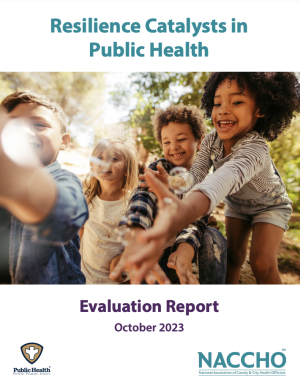Resilience Catalysts
Resilience Catalysts in Public Health
Leading Public Health 3.0: Reducing and eliminating adversity by fostering equity through policy, practice and program change to build resilience.
Resilience Catalysts (RC) operationalizes the Community Resilience (CR) framework developed at GW to provide a pathway for local health departments (LHDs) across the country to convene multiple sectors to address root causes of inequity in their communities. As Community Health Strategists, LHDs identify structural drivers of adversity and work across sectors to implement policy, program, and practice changes to foster equity and build community resilience.
Download the Resilience Catalysts in Public Health summary (PDF)
What's In the Soil?
Learn about why addressing root causes of adversity is key to building community resilience.
Resilience Catalysts Overview
How can public health use systems thinking to address root causes of adversity? Learn about the Resilience Catalysts (RC) process in this video.
RC Publications
From 2019 to 2024, three cohorts of LHDs have completed the RC process. Read about our successes and learnings below!
Evaluation Report: Resilience Catalysts in Public Health
Read this report to learn about the RC process and how sites implemented CCR’s Community Resilience framework as a Public Health 3.0 strategy to address both adverse childhood experiences and adverse community environments.

Addressing Systemic Inequities: An Evaluation of the Resilience Catalysts in Public Health Program
CCR's Resilience Catalysts in Public Health program was recently featured in the Journal of Public Health Management and Practice (JPHMP). The article captures learnings from CCR and NACCHO's implementation of the Resilience Catalysts in Public Health program.
RC Sites

Cohort 1
- Appalachian District, NC: Increasing economic mobility in rural Appalachia
- Cambridge, MA: Reducing suicide rates among young men of color
- Mesa County, CO: Equitable access to child care
- Louisville, KY: Reducing disparities in evictions
Cohort 2
- Alameda County, CA: Addressing systemic drivers of gun violence
- Baltimore City, MD: Disrupting cycles of trauma that underpin city wide violence
- Leon County, FL: Reducing the Asset Limited, Income Constrained, Employed (ALICE) population
- Shelby County, TN: Reducing community violence
Cohort 3
- Cleveland, OH: Increasing access to stable, safe, and affordable housing
- Jersey City, NJ: Reforming housing development practices to reduce displacement of legacy residents
- Lee County, IA: Increasing family friendly workplace environments to support child wellbeing



